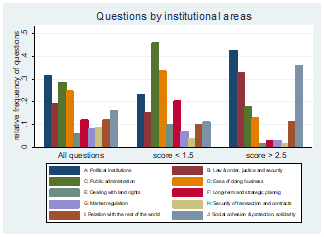Romain Houssa and François Bourguignon (2023), Edited by François Bourguignon , Romain Houssa , Jean-Philippe Platteau & Paul Reding, Cambridge University Press
Abstract
We review evidence on the institutional weaknesses underlying economic development problems in Benin, analysing various sources of information including cross-country databases and an original opinion survey among decision makers in Benin. Three pressing institutional issues are found. First, the most serious impediment is corruption, which is seen as responsible for several key dysfunctions in almost all sectors: the political and electoral systems (vote buying), the relationship between business and the public administration (rigged procurement) or the judiciary system, land rights, or complicity between politicians and the media. Second, weak public management deteriorates the quality and the delivery of public services. It is most characterised by opacity of government policy-making to the public, ineffective regulation of the power sector, and a complex tax administration grossly inefficient in tax collection. Third, the level of informality is much higher in Benin than in the average sub-Saharan African country. This generates several economic costs including tax revenue loss, job precariousness, unfair competition for formal firms, and lack of control over the economy.

